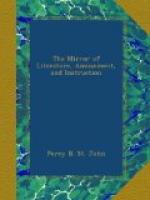The foregoing are all the announcements we have been able to collect. We miss two or three established favourites; but we hope to make their promises the subject of a future paragraph.
* * * * *
THE GOOSE.
In England the goose is sacred to St. Michael; in Scotland, where dainties were not going every day,
“’Twas Christmas sent its savoury goose.”
The Michaelmas goose is said to owe its origin to Queen Elizabeth’s dining on one at the table of an English baronet on that day when she received tidings of the dispersion of the Spanish Armada, in commemoration of which she ordered the goose to make its appearance every Michaelmas. In some places, particularly Caithness, geese are cured and smoked, and are highly relishing. Smoked Solan geese are well known as contributing to the abundance of a Scottish breakfast, though too rank and fishy-flavoured for unpractised palates. The goose has made some figure in English history. The churlishness of the brave Richard Coeur de Lion, a sovereign distinguished for an insatiable appetite and vigorous digestion, in an affair of roast goose, was the true cause of his captivity in Germany. The king, disguised as a palmer, was returning to his own dominions, attended by Sir Fulk Doyley and Sir Thomas de Multon, “brothers in arms,” and wearing the same privileged garb. They arrived in Almain, (Germany,) at the town of Carpentras, where,
“A goose they dight to their
dinner.
In a tavern where they were.
King Richard the fire bet,
Thomas to him the spit set;
Fouk Doyley tempered the wood;
Dear a-bought they that good;”
for in came a Minstralle, or she-Minstrel, with offer of specimens of her art in return for a leg of the goose and a cup of the wine. Richard, who loved “rich meats,” and cared little at this time for their usual accompaniment, “minstrelsy,”—
“—bade that she would go; That turned him to mickle woe. The Minstralle took in mind, And said, ye are men unkind: And if I may ye shall for-think Ye gave me neither meat nor drink!”
The lady, who was English, recognised the king, and denounced him to the king of Germany, who ordered the pilgrims into his presence, insulted Richard, “said him shame,” called him taylard, probably for his affection for goose, and finally ordered him to a dungeon. But Richard, a true knightly eater, who, besides roast goose, liked to indulge in
“Bread
and wine,
Piment and clarry good and fine;
Cranes and swans, and venison;
Partridges, plovers, and heron,—
was neither dainty nor over-nice. At a pinch he could eat any thing, which on sundry emergencies stood him in great stead. Wax and nuts, and tallow and grease mixed, carried him through one campaign, when the enemy thought to have starved out the English army and its cormorant commander. The courage and strength of Richard were always redoubled after dinner. It was then his greatest feats were performed.—Romance of Coeur de Lion.




